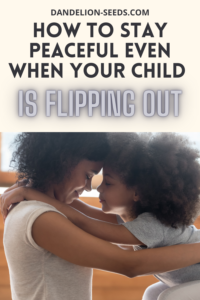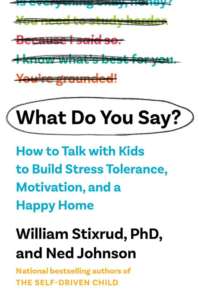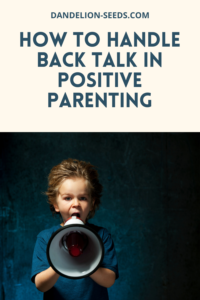
Sign in
Don't have an account with us? Sign up using the form below and get some free bonuses!

Talking back, or "back talk," is when a child pushes back on what an adult (often their parent) is saying, demonstrating what adults perceive as a lack of respect. It may include verbal components, up to and including the child having a shouting match with their parents, as well as nonverbal components, such as eye rolling.
Back talk can be MADDENING for even the most peaceful parents. No one likes yelling or being yelled at; yelling or any kind of negative attitude naturally puts our nervous system in "danger" mode.
Still, talking back is a normal part of growing up. Kids have strong emotions just like adults do, and it's natural for them to express their anger, frustration, and general angst.
Kids are learning how to assert their boundaries, wishes, and needs in emotionally authentic ways that also work for others. Life can be a bit bumpy while they're figuring this out -- especially since the part of the brain that renders them capable of taking others' perspectives, the right parietal lobe, doesn't fully develop until the late teens or early 20s (source).
What's the positive parenting perspective, then, when a child talks back? Do we just let it go when children aren't speaking in a respectful manner? Are there "consequences" when kids do this?
Take a deep breath, dear parents -- you don't need to let it go entirely. You can still set clear limits in ways that are both peaceful and respectful. Here's how to handle it when kids talk back, all within the framework of positive parenting.

For starters, parents can do a few things to encourage their child to not talk back. The most effective way to teach respect is always through genuine connection with our kids.
We literally cannot teach a child who's in the midst of talking back. They talk back when they're struggling, and for a child who's struggling and angry, the learning part of their brain is effectively "turned off." Children must be emotionally regulated to learn. This is true at home as well as at school (source).
With that in mind, be proactive about spending quality time and creating joy together. It's the basis for all emotional connection. Secure attachment largely stems from a sense of mutual delight (source).
Model during times of calm and peace that you're there to listen and respect your child. The best way to encourage respect is to model the gentle behavior we want to see. After all, kids learn by what we do, not by what we teach through words alone.
The more you practice listening and connecting during times of low stress, the more easily you'll default to connection when conflict arises. In fact, connection begets connection -- and respect begets respect. The more often we feel emotionally connected to others, the more unnatural it feels when we don't. We want disconnection to feel unnatural, because it's not our natural state!

Here are three tools to help make parenting a bit easier through the gift of connection, even when your child is talking back.
We've heard from experts like Dr. Ross Greene that all behavior is communication. The same goes for talking back. Think of talking back as communicating something deeper that the child doesn't yet know how to peacefully articulate.
Talking back is neither "good behavior" or "bad behavior" -- it's simply an attempt to get their needs met.
Although it's downright hard for parents to take this perspective (parenting can be challenging!), what happens when you ask, "What kind of pain is my child in that they're acting this way?"
Children who feel good, connected, and peaceful generally exhibit what we perceive as respectful behavior.
Are they feeling angry? Scared? Are they grieving something, such as a new baby in the family or a new job that takes you away from them more often? Are they upset about a parent's work schedule and suddenly having less time together; a social or academic struggle; or are they just plain tired, hungry, or over- or under-stimulated?
Or, perhaps, if the child has been in school all day, they may simply be tired of not having had much "say" in their life. Even at home, maybe they've been following others' schedules (parents', siblings, etc.) and feel like they haven't had a vote in the flow of their day.
Often, kids "talk back" when they're not feeling HEARD. What's the fastest way to stop the back talk? Slow down and LISTEN. What's their perspective? What's important to them? How can you go beyond hearing their words and hear their HEART?
When you practice listening without judging or interrupting, back talk often disappears. This does not mean you need to agree with them. Instead, it models for your kids that they're worthy of being heard.
All this said, it's normal to feel angry, frustrated, and triggered when kids talk back. Here are more things you can do to help the child feel heard while also dropping unnecessary power struggles.
Related mini-course: Staying peaceful in the moment

It's incredibly tempting to perceive talking back, rude gestures, and rude behaviors as being "naughty," "bad," or just plain -- well -- rude.
When we use these negative judgment labels, however, it puts us even more on the offensive, and can trigger our fight or flight response. We naturally go into self-protective mode (which is exactly what our brains have evolved to do). In fact, there's even a term for it when stress triggers our fight or flight response in our nervous system: it's called an amygdala hijack (source).

When we're stressed and in fight or flight mode, our brain doesn't respond rationally. It simply makes us react without thinking. We may end up saying or doing hurtful things. In other words, we become the parent we don't want to be.
So, how can parents "override" their triggered reactions and keep control of how they respond?
One way to get control of the part of our brain that keeps us peaceful -- and out of reactive mode -- is to change the words we use to describe what's going on.
It takes practice, for sure. We can't expect to get this "right" overnight, so please be gentle with yourself.
However, every time we practice -- even if we just visualize being the parent we want to be -- it helps strengthen our neural connections in the ways that reinforce what we want to have happen. Practice makes it easier.
As an example, what if we practice reframing disrespectful behavior as behavior of a child who's struggling?
Although we may not appreciate their approach when a child talks back, we can find empathy for a child who's hurting inside. It's easier to push the judgment and frustration aside when we realize behavior issues are simply a reflection of the child's internal state.
Likewise, we can also avoid even positive judgment labels, such as "My child is so good!"
Why should we avoid even positive labels for kids? Simply by virtue of having "good" labels in parenting, our brain also searches for the counterpoint: in this case, the "bad." Behavior is just behavior. No child is always anything, so when we stop using labels of any kind to describe the child, we're less inclined to get into black-and-white thinking that doesn't serve the relationship.
Yes, we can label actions rather than our child holistically, but even that can be a slippery slope. It's more beneficial to reframe even our positive observations in ways like this:
Words have a lot of power; we can use this power in ways that serve the relationship and encourage our ongoing connections. Be specific about the things you catch your children doing right, and they'll be more impactful. Express gratitude when you note these specifics.
Although some parents believe that giving a child consequences in the form of punishment is the only way to curb negative behavior, this often results in a power struggle, more yelling, and all the other things we're striving to avoid.
In fact, negative attention (be it corporal punishment, verbal abuse, removal of privileges, time out or isolation strategies, and other punitive measures further disintegrate the already struggling relationship.
..."[Determining whether punishment 'works' depends whether you're looking at the short-term or the long-term. Short-term, behavior modification systems, including those that promote isolation in a punitive way, can indeed 'motivate' the child to comply.
We're not looking for short-term wins, however. This is fear-based and control-based parenting. Rather than driving kids to 'obey,' it actually drives children to simply hide their behavior from us. They just get better at not getting caught so that they avoid punishment.
Furthermore, isolation-based strategies can damage their trust in us. These strategies don't promote respect; if anything, they damage it..." (source)
Related mini-course: The World Is Tough: Shouldn't We Toughen Up our Children?
Much healthier -- and much better teachers in the long run -- are natural and logical consequences. I'll share examples below, but in short, life is a very effective teacher. As such, we can use our everyday experiences together to model respectful communication.

Respectful communication is a learned habit. Just like with all habits, the best ways for kids to learn healthy communication skills is to learn by example. Remember that they're
Related book recommendations that benefit all relationships: Non-Violent Communication, Atomic Habits, Why Won't You Apologize: Healing Big
Betrayals and Everyday Hurts (afflinks)
Book recommendations specific to parenting: What Do You Say? and Parent Effectiveness Training: The Proven Program for Raising Responsible Children
As challenging as it can be, when you hear your child starting to talk back, pay attention to your own approach in this moment. Oftentimes, the effect of "looking in the mirror" is a reminder to soften ourselves, first.

Real life is the best teacher. When children express their anger while feeling "out of control" (which is totally normal, since the part that "controls" their impulses doesn't fully develop until they're 25 - 30 years old!), a natural consequence is that the recipient of their anger won't like it.
Further, if they're talking back to other children, the natural consequences are often that those children won't want to play with them. The same goes for members of the family: a parent or sibling may feel hurt and may not respond well.
The child will realize that people tend to retreat emotionally when their feelings are hurt -- and over time, they'll learn that words are powerful.
To be clear, I'm not saying we should shame or punish a child in any way. Even parents and other family members can be aware enough to use non-violent communication strategies. Here's an example of what that might sound like:
"Hey, sweetheart. When you speak to me that way, I feel angry. I want to have a peaceful relationship with you. Would you be willing to go outside with me and breathe some fresh air before we continue this talk peacefully? I'll be able to listen better when I get out of the house for a moment."
Alternatively, we might calmly say,
"I hear how upset you are. I want to be able to talk about this, but I won't be called names. Please pause for a moment and then let's continue without name calling."
You get to have, and lovingly enforce, healthy boundaries.
Sometimes when a child talks back and the parent wants to be peaceful, the parent can end up feeling powerless. Feeling powerless is not the goal. To the contrary, you still have plenty of power to help heal the relationship.
Here are some logical consequences that teach:
Think of big feelings like a volcano. When the volcano overflows, things get messy. If we can proactively keep the lava low, however, it won't overflow. Some ways to get big feelings out proactively include listening to music with a heavy beat, dancing with large movements, or yelling (the yelling can be about anything -- go outside and yell, "THE SKY IS SO BLUE TODAY!" Whatever. It doesn't matter. The point is that you're "venting the volcano" so it doesn't overflow.
The answer is often allowing the big feelings to exist and releasing them peacefully, rather than stuffing them down (here's how). This can do wonders for the nervous system.
Finally, when a child is talking back, it can be helpful to have a pre-established code word to let you know when one or both of you needs to cool off. The moment either of you uses it, it lets the other know they need co-regulation and connection.
After all, connection is our natural state, and healing together is always possible.
